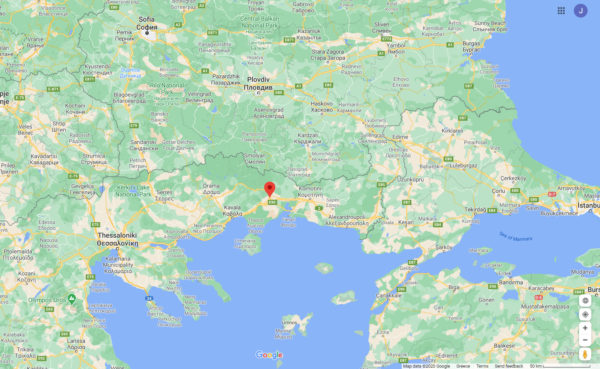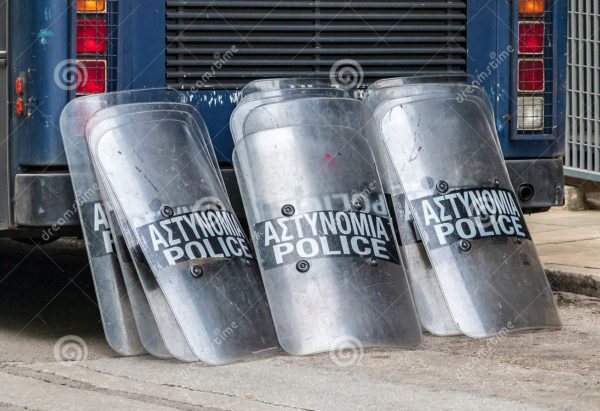The respondent is a 30-year-old Algerian man. On the 3rd of January 2020, he was arrested close to the train station in Xanthi, in north-eastern Greece, after police asked him for his “papers.” This document refers to a temporary residency permit of 30 days which is commonly known as khartia. It demonstrates that the police have identified and registered a third-country national who has entered Greece illegally.
As long as the document is valid, the holder cannot be deported to their country of origin.

The respondent was held at a police station in the Halkidiki area (50 km from Thessaloniki) for 35 days and afterwards at the Metagogon Transfer Centre in Thessaloniki for another five days.
While detained, the respondent received 6 Euros per day to spend on food. There was a shower next to his bed but he had to ask the authorities to use the toilet. The facilities were not cleaned and the inmates had to purchase cleaning products themselves.
The respondent reported overserving incidents of excessive force by authorities – daily. He was afraid to ask for his legal rights as he expected to be beaten up or mistreated.
“He said they don’t respect us and they treat us as not human beings. They took the clothes off the people and they take the pictures of them. A lot of bad things happened inside.”
The authorities informed the respondent that he will stay in prison until they decide what they would do with him. He was not given the support of an arabic translator and was forced to sign papers he could not understand as they were in Greek. The respondent did not ask for asylum as he wanted police papers to leave the country. In Halkidiki and Metagogon, the police took pictures and fingerprints of him.
After Metagogon, the respondent was transferred to the Drama Paranesti Preremoval Centre (northeastern Greece) with 40 other male people-on-the-move (POM).
Upon their arrival, local police in “blue uniforms” confiscated the mobile phones and money of the POM. If someone objected, they were subsequently beaten. These personal belongings were never returned.
In Drama, the conditions were reportedly poor and the police inflicted violence upon the detainees. Following a protest over the conditions of their detention, for instance, ten riot police officers were called. Each wore a black uniform, balaclavas and carried a “big shield”, the respondent asserted. They then proceeded to systematically “beat everyone in the camp with sticks and kicks.”
“They break your hands or your legs, but that is so bad he said like in your back, in your head.”
This corresponds to earlier reports obtained by the Border Violence Monitoring Network which describe brutal beatings in Drama.

The respondent stayed here for approximately four and a half months.
On approximately the 23rd of April, the respondent was informed he was going to be brought to Amygdaleza Preremoval Detention Centre. He could not recall the exact date, however said it was “the first day of Ramadan.” This brings the BVMN to the suggestion that it was the 23rd of April.
Despite the remarks of the camp authorities, the respondent was instead pushed back to Turkey, near İpsala. Other BVMN testimonies document similar practices in which POM are led to believe they will be sent to other detention centres in Greece but are, in fact, violently expelled to Turkey.
Between 30 and 40 POM were corralled into four busses, each bus contained eight cells with four people in each. They drove for two hours from Drama to a police station close to the Evros river by the Greek-Turkish border.
The buses arrived at 4:00 pm and the POM were placed inside a “police station”. According to the respondent, this building is located “somewhere in the woods” and “looks more like a squat than an official police station.”
“[These] people [are] specifically for beating the people.”
The officers inside the facility wore civil clothes, balaclavas and spoke Greek. They instructed the group to take off their clothes, their hair was cut and they were beaten until they would fall to the ground. The respondent stated: “I can’t account it, because they do that without stop, they bring 10 people from us and they will beat them till they will fall down, all of them.”
At 11:00 pm, the group left the police station and were led onto a bus. It was a different vehicle to the one before; it was smaller and could only fit around 20 people. Five police officers escorted them in another car, they were the same personnel from the squat.
Before their departure, the respondent witnessed the officers exchange the Greek registration plate for a Bulgarian one on their car. He assumed they did this as they were close to the Bulgarian border. In connection with the officers use of civil clothing, this procedure is presumably used to deflect culpability of the Greek state.
After a drive of approximately 15 minutes, they reached the Maritsa River. On the riverbank, POM would not be quiet were assaulted and pushed into the water. Many had serious injures from the beatings at the squat, attested the respondent.
“Some people were in a bad bad bad situations like some of them like breaking hands, breaking legs from the beating of this people in balaclavas.”
Next, around 10 people were loaded into a “light blue dinghy” and ferried across the river. In describing those who manned the boats, the respondent stated: “I can’t mention exactly the countries but they look like Pakistanian, Afghanian, Syrian, they were wearing also balaclavas.” Numerous testimonies collected by the BVMN have identified a trend in which third-country nationals are used to drive the dinghies to the Turkish side of the Maritsa River – in effect, performing the pushback on behalf of the Greek authorities. Most commonly, these individuals are from Afghanistan and Pakistan.
This practise further supports the contention that the Greek state is seeking to circumvent culpability for its illegal migration policies.
The respondent and the group he was pushed back with did not have their clothes returned. They eventually were detected and assisted by the Turkish army.
“We were without clothes and it was so cold there in the border.”
